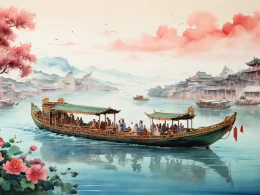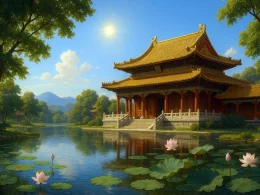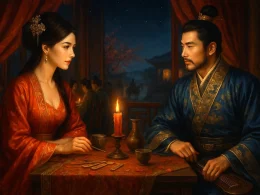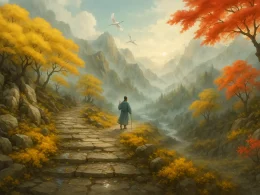That old moonlight - how many times
Did it watch me by plum blossoms, playing chimes?
Calling the jade maiden, undeterred by cold,
To pluck the blooms with fingers bold.
Now like He Xun, aged and worn,
I've lost my spring-breeze verse, forlorn.
Yet wonder why beyond bamboo, sparse flowers
Send cold fragrance to my jade bowers.
Riverlands so still, so deep,
Snow starts to pile where longings creep.
Jade cups brim with easy tears,
Red buds brood on silent years.
I always remember where we stood,
A thousand trees weighed West Lake's chill flood.
Now petals scatter one by one -
When shall we meet under the sun?
Original Poem
「暗香 · 旧时月色」
旧时月色,算几番照我,梅边吹笛?
唤起玉人,不管清寒与攀摘。
何逊而今渐老,都忘却春风词笔。
但怪得竹外疏花,香冷入瑶席。江国,正寂寂,叹寄与路遥,夜雪初积。
姜夔
翠尊易泣,红萼无言耿相忆。
长记曾携手处,千树压、西湖寒碧。
又片片、吹尽也,几时见得?
Interpretation
Composed in the winter of 1191 during Emperor Guangzong's reign, this ci poem was written by Jiang Kui after his snow-laden visit to Fan Chengda at Stone Lake, where he stayed for over a month. Along with "Sparse Shadows," it forms the celebrated "Twin Odes to Plum Blossoms." Using the plum as its central image, "Fragrant Shadows" embodies the poet's nostalgia for departed friends and his lost homeland, while also revealing his personal sorrow over a rootless existence and the relentless passage of time.
First Stanza: "旧时月色,算几番照我,梅边吹笛?唤起玉人,不管清寒与攀摘。"
Jiù shí yuè sè, suàn jǐ fān zhào wǒ, méi biān chuī dí? Huàn qǐ yù rén, bù guǎn qīng hán yǔ pān zhāi.
That old moonlight—how many times
Did it find me piping by plum boughs,
Rousing my jade-skinned love to climb
Through frost, breaking sprays for our vows?
The stanza opens with "old moonlight" (旧时月色), invoking tender memories where flute notes, lunar glow, and plum fragrance intertwine with a beloved figure ("jade-skinned"). The verb "rousing" (唤起) animates the scene, while "breaking sprays through frost" (攀摘) captures love's fearless ardor.
Second Stanza: "何逊而今渐老,都忘却春风词笔。但怪得竹外疏花,香冷入瑶席。"
Hé Xùn ér jīn jiàn lǎo, dōu wàng què chūn fēng cí bǐ. Dàn guài dé zhú wài shū huā, xiāng lěng rù yáo xí.
Like aging He Xun, I've grown dull—
My spring-breeze verses all forgone.
Yet why do sparse blooms beyond bamboo
Pierce my feast with cold scent alone?
The allusion to He Xun (何逊), a Liang dynasty poet known for his plum poems, becomes a metaphor for the author's waning creativity. Though claiming to have "forgotten spring-breeze verses" (春风词笔), the intrusion of plum fragrance into his "jade feast" (瑶席) betrays enduring emotional ties—memory's chill haunting the present.
Third Stanza: "江国,正寂寂,叹寄与路遥,夜雪初积。翠尊易泣,红萼无言耿相忆。"
Jiāng guó, zhèng jì jì, tàn jì yǔ lù yáo, yè xuě chū jī. Cuì zūn yì qì, hóng è wú yán gěng xiāng yì.
The River Land lies hushed, snow-newly clad.
Too far to send word—I sigh.
Jade cups brim with tears; red buds,
Speechless, stoke embers of goodbye.
"River Land" (江国) ambiguously references both the plum's habitat and the poet's longed-for south. Fresh snow amplifies isolation, while "jade cups brim with tears" (翠尊易泣) and "speechless red buds" (红萼无言) exemplify pathetic fallacy—projecting grief onto objects. The "embers of goodbye" (耿相忆) smolder with unextinguished longing.
Fourth Stanza: "长记曾携手处,千树压、西湖寒碧。又片片、吹尽也,几时见得?"
Cháng jì céng xié shǒu chù, qiān shù yā, Xī Hú hán bì. Yòu piàn piàn, chuī jìn yě, jǐ shí jiàn dé?
I still see where we walked, hands twined:
A thousand trees bowed West Lake's icy sheen.
Now petals scatter wind-torn—
When shall we meet again, love-lorn?
The finale returns to shared memory: plum branches "bowing" (压) the lake's surface under their snowy weight. The present's "wind-torn petals" (吹尽) mirror love's dissolution, while the closing question—"when shall we meet?"—hovers between hope and resignation, its lightness belying profound sorrow.
Holistic Appreciation
This ci poem employs the plum blossom as a medium for emotional expression, weaving between reality and memory with ethereal imagery and profound sentiment. The work not only reminisces about past acquaintances and places but also conveys deep lamentations about personal fate and aging. The poet opens with "moonlight of bygone days," immediately establishing a nostalgic tone, then uses tranquil images like "sparse blossoms beyond the bamboo" and "night snow in the river country" to accentuate inner solitude and sorrow. The concluding lines—"petals scattering away" and "when shall we meet again"—linger with endless longing.
Artistic Merits
- Fusion of Scene and Emotion, Interplay of Real and Imagined: Memories and reality intertwine seamlessly, blending feeling and landscape in a dance of the tangible and intangible.
- Exquisite Diction, Ethereal Imagery: Phrases like "chill clarity," "sparse blossoms," "jade mat," and "cold jade" are delicate yet rich, austere yet deeply emotive.
- Masterful Allusions, Symbolic Depth: The self-comparison to "He Xun" reveals introspective melancholy, while plum blossoms, red calyxes, and night snow become vessels for tender reflection.
Insights
Through the plum blossom's symbolism, this ci poem articulates the cherishing of beautiful memories amid life's disappointments, showcasing the poet's acute sensitivity to time's passage and steadfast adherence to noble character. It reminds us that even in loneliness and winter's harshness, one should never forget the fragrance and moonlight that once warmed the soul—perhaps the true essence of "subtle fragrance."
About the poet
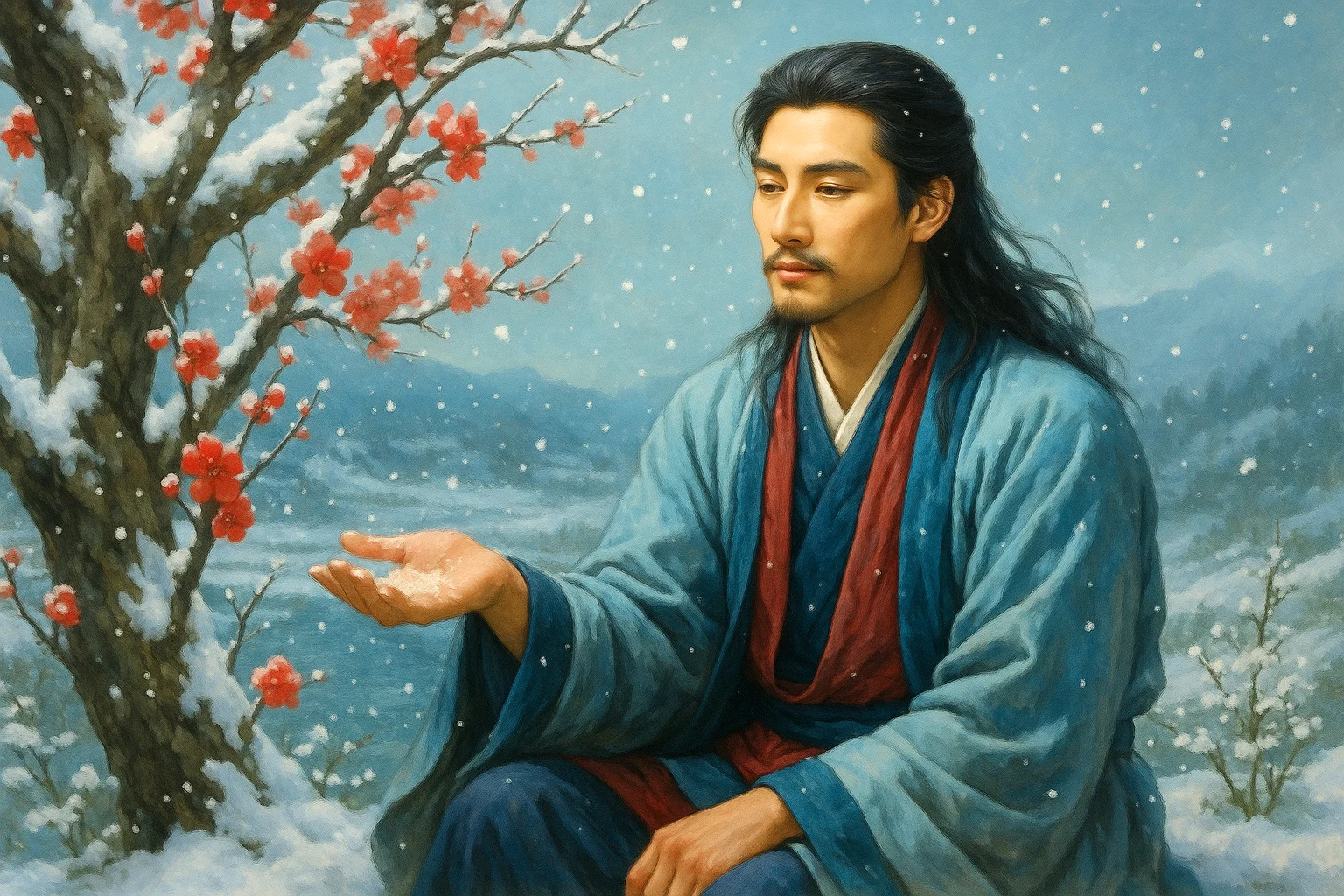
Jiang Kui (姜夔, c. 1155 - 1221), a native of Poyang, Jiangxi, was a Southern Song Dynasty lyric poet and musician. He remained a commoner throughout his life. His lyrics are known for their ethereal and austere style, and his poetry is also highly regarded. Along with Fan Chengda and Yang Wanli, he is celebrated as one of the "Four Great Masters of the Restoration."









